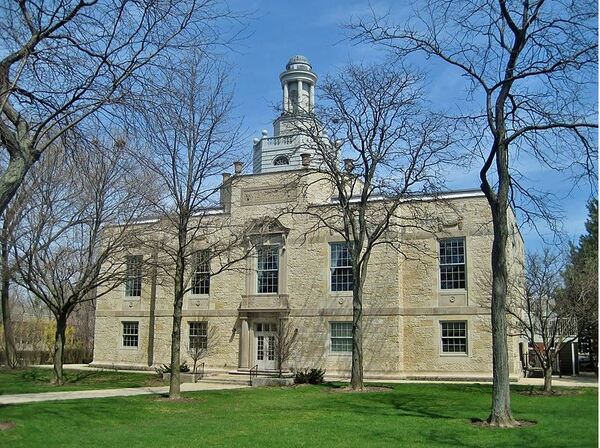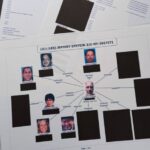
–>
July 6, 2022
At 10:14 a.m. on July 4, 2022, a young man named Robert Crimo III allegedly aimed his rifle into the crowd at his hometown’s Independence Day parade and opened fire.
‘); googletag.cmd.push(function () { googletag.display(‘div-gpt-ad-1609268089992-0’); }); }
Within moments, the Chicago suburban town of Highland Park was a scene of terrible carnage. Seven innocent people killed, more than 40 injured, at this writing. The alleged killer escaped the scene, but was caught that afternoon (we say “alleged,” because, while he has not yet been convicted, all sources agree that he was the perpetrator, without question).
Compliments to the many law enforcement and medical professionals who dealt with this unexpected nightmare, on what should have been one of our nation’s longest-running celebrations, the anniversary of the signing of our Declaration of Independence.

Highland Park city hall
Within minutes, we heard politicians and newspeople, responding to the attack, getting everything wrong – making assumptions, using euphemisms, avoiding key truths.
‘); googletag.cmd.push(function () { googletag.display(‘div-gpt-ad-1609270365559-0’); }); }
No, it was not senseless.
No, it was not random.
No, it was not a tragedy.
Words Matter.
“Senseless,” “random,” “tragedy.” These are terms we use for accidents, or in the theatre, for the unavoidable “bad things that sometimes happen to good people.” A tragedy is when one was in the wrong place at the wrong time, or one made a sad mistake that unintentionally compounded. If anyone is to blame for a tragedy – as we know from Shakespeare’s work – it was the otherworldly spirits known as the Fates.
And such plotlines are fiction.
‘); googletag.cmd.push(function () { googletag.display(‘div-gpt-ad-1609268078422-0’); }); } if (publir_show_ads) { document.write(“
There is a desire today, often subconscious, but still real, to avoid admitting true guilt, even in others. But this event was not senseless; it made sense to the shooter.
It was not random; he picked the timing, the method, the location, with care, to achieve maximum effect.
And it was not a tragedy. This wasn’t a matter of some old Fate choosing when to cut the thread of life. It was a planned crime, a series of malicious choices, to load the weapon, to aim the weapon, to fire upon innocent people in cold blood.
It is pure evil. It is terrorism.
We must make this distinction, because already there are people making excuses, saying it’s society that’s at fault… the availability of firearms, the omnipresence of war news on television, the violence in video games… or saying that he’s clearly crazy – “you have to be, to do a thing like this, after all” – so we are told that we should blame his mental illness, not him.
We must resist these temptations. There are no excuses for the cold-blooded murder of innocent paradegoers. None. Even if some substance – from an ingested drug to a chemical imbalance in the brain – tormented this killer in his wicked mind, that still cannot be considered an excuse. Even if he couldn’t help an inclination, he cannot be forgiven for choosing to act upon it, and commit this awful crime.
It was mass murder, and for that, the only rational sentence, once prosecuted and convicted, is capital punishment. Anything short of that means that our society values murderers more highly than law-abiding potential victims.
A Day of Endless Crimes
News reports speak of the many people whom this young man killed or injured. That will be the bulk of his prosecution, but he also committed countless crimes for which he can never be prosecuted or punished.
By destroying this one celebration, in this one town, this demon stole a day of joy from the participants, the thousands of attendees who had to flee the parade route. Many of them will have this moment of terror imprinted in their memories for the rest of their lives. Think of the people, especially the children now suffering PTSD, who may never be able to fully enjoy a parade again, who may never even dare to try attending one again, all because of this one monster’s actions.
Highland Park wasn’t the only parade broken up this year. Within minutes of the attack, other cities began announcing their own cancellations. Parades, festivals, and evening fireworks were cancelled in town after town, out of “an abundance of caution.” Countless individuals and families were robbed of their ability to enjoy their Independence Day, as police advised neighbors to shelter in place, and as mayors, city councils, and event committees lined up to shut down the events on which they’d worked for a year.
Arlington Heights, Buffalo Grove, Deerfield, Elgin, Evanston, Glencoe, Glenview, Itasca, Lake Forest, Libertyville, Lombard, Morton Grove, Mount Prospect, Oak Park, Rolling Meadows, Skokie, and countless other communities both near and far made the call within the hour, with many more to follow as the afternoon wore on.
It’s important to think about these events, too, from all sides, not just from the perspective of the attendees whose plans were upset.
When an event is cancelled, investments are lost, wasted, destroyed.
- Countless music acts lost their gigs. Even those who were able to collect a cancellation fee from the cities and towns that had hired them will still suffer, because bands use these gigs to attract other jobs, to get themselves selected for weddings, fundraisers, bar bookings, etc.
- Countless concession businesses and their employees lost an important day, for some of them, the most important day of their year. Just like the bands, many local restaurants use these festivals to gain name recognition, to introduce the public to their menus, in particular, to their specialties. Their workers lose out on a night of pay and tips; the restaurants and other concession owners will have tons of food waste, as perishable meat, vegetables and bread products, purchased for the day, cannot be returned.
- And don’t forget the parades themselves. These are opportunities for local scout troopes, dance troupes, even martial arts groups to show off their numbers and advertise to new prospects. Local marching bands perform for their neighbors. Local, even statewide, political parties and candidates introduce themselves to their electorates.
The cancellation of a parade or festival robs all these groups – especially candidates – of a part of their model that has become critical to success in our society. It cannot be easily replaced.
Even though all these cancellations are direct results of the Highland Park attack, we cannot prosecute this perpetrator for any of them. He has robbed tens of thousands of individuals and entrepreneurs of what may have been, in many cases, the make-or-break event for their businesses or even their careers.
When you count the cost to these businesses, the spoiled food, the missed connections, the lost advertising, these lost profits are beyond millions. Will anyone add up the costs of these cancellations? Can the value of such lost opportunities even be estimated?
For a nation that has taken so many hits in recent years, for this to happen on our nation’s most important holiday is horrific indeed.
The Bill of Rights
We cannot address a mass murder event without considering the Second Amendment. The Left will imagine that even more gun restrictions, more background checks, more government regulation, would somehow have prevented the event. The Right will stress – rightly – that if more in the crowd had been armed, the event might have been stopped much sooner, and lives would certainly have been saved.
But as true as it is that an armed populace is a safer populace, the fact is, this kind of horror isn’t really about the Second Amendment; it’s about the First.
The First Amendment guarantees us – as Americans – the freedom to peaceably assemble.
To gather together in large crowds – whether for parades or festivals, political conventions or rock concerts, movie theaters or dance contests, shopping malls or baseball games – is more than a Constitutional right; it is part and parcel of our society.
Terrorism – whether blatantly political or not – is, at its core, an attack on the freedom of assembly.
As students of history, we have seen totalitarian regimes institute curfews, close churches and entertainment venues, require papers for travel, even post snitches on every block to monitor and discourage their citizens’ movements.
We, as freemen, should be immune to such constraints. We can travel anywhere in our country, shop at any store, attend any church, dance at any nightclub. The government has no right to curtail these choices… but every mass killing like this, every growing crime statistic, has the same effect, moving us ever closer to an immobile society, where, motivated by fear, we no longer gather together, but rather, we work from our home offices, do our shopping online, and live like mushrooms in our basement offices, without human interaction.
Man is a social animal; free men, even more so.
Parades, festivals, concerts and parties are as much a part of the American experience as the Declaration of Independence itself. Closing them down, or even just giving regular people good reason to fear their attendance, is itself the ultimate in terror.
We don’t know, at this writing, whether this particular perpetrator was inspired by Antifa or Occupy or ISIS or any other specific group. He may have thought he was acting out all on his own. But no matter whether he – or any other event-focused mass murderer for that matter – was consciously motivated by a political philosophy or not, the end result is certainly political, in that the result serves the Anti-American terrorists’ goal.
Make Americans fear gathering in groups, and you have unmade America.
That’s terrorism, and we must resist its progress.
John F. Di Leo is a Chicagoland-based international transportation professional. A one-time Milwaukee County Republican Party chairman, he has been writing a regular column for Illinois Review since 2009. His book on vote fraud (The Tales of Little Pavel) and his political satires on the current administration (Evening Soup with Basement Joe, Volumes I and II) are available on Amazon.
Image: Teemu, via Wikimedia Commons // CC BY-SA 2.0
<!– if(page_width_onload <= 479) { document.write("
“); googletag.cmd.push(function() { googletag.display(‘div-gpt-ad-1345489840937-4’); }); } –> If you experience technical problems, please write to [email protected]
FOLLOW US ON
<!–
–>
<!– _qoptions={ qacct:”p-9bKF-NgTuSFM6″ }; ![]() –> <!—-> <!– var addthis_share = { email_template: “new_template” } –>
–> <!—-> <!– var addthis_share = { email_template: “new_template” } –>




